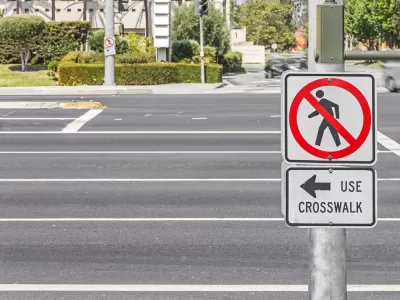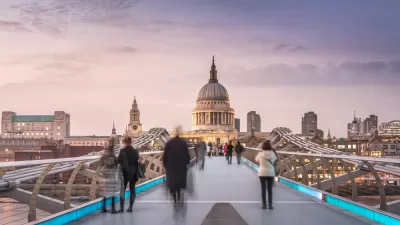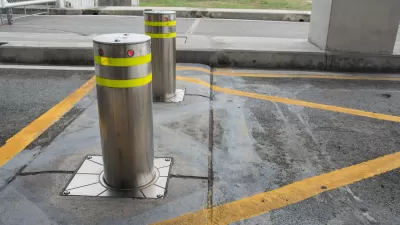Plenty of sidewalks stand in need of improvement, and many aren't there at all. But they're also a symbol of the automobile's engineered dominance of our roads.

According to Alissa Walker, the multi-modal city of the future might lack sidewalks, and that's a good thing. "'Sidewalks' is actually a misnomer," Walker writes, "because before cars existed, all modes of transportation mixed freely in the street: streetcars, carriages, horses, pushcarts, and, most of all, people walking in every direction."
The rise of the automobile pushed pedestrians to the side, and modern roads often deny them a place to walk altogether. "American society has so normalized our inferior sidewalk system that we don't believe we deserve a place to walk."
Meanwhile, a supposed "walking revolution" hasn't materialized, despite Complete Streets redesigns and campaigns to promote walking. "In 2016, Americans drove more miles than they have in any other year in history."
Frustratingly, says Walker, pedestrian improvements are now often perceived as a sign of gentrification. "Yet clean, safe, unbroken sidewalks have become such a rarity in this country that designing an area where people can get around primarily by walking—the one mode of transportation that is available and accessible to everyone—is now seen as a harbinger of displacement."
Truly shared streets would open up space for new modes, and a return to old ones. And as boomers age out of driving, we may see rising momentum for real pedestrian improvements.
FULL STORY: The case against sidewalks

Maui's Vacation Rental Debate Turns Ugly
Verbal attacks, misinformation campaigns and fistfights plague a high-stakes debate to convert thousands of vacation rentals into long-term housing.

Planetizen Federal Action Tracker
A weekly monitor of how Trump’s orders and actions are impacting planners and planning in America.

In Urban Planning, AI Prompting Could be the New Design Thinking
Creativity has long been key to great urban design. What if we see AI as our new creative partner?

Pedestrian Deaths Drop, Remain Twice as High as in 2009
Fatalities declined by 4 percent in 2024, but the U.S. is still nowhere close to ‘Vision Zero.’

King County Supportive Housing Program Offers Hope for Unhoused Residents
The county is taking a ‘Housing First’ approach that prioritizes getting people into housing, then offering wraparound supportive services.

Researchers Use AI to Get Clearer Picture of US Housing
Analysts are using artificial intelligence to supercharge their research by allowing them to comb through data faster. Though these AI tools can be error prone, they save time and housing researchers are optimistic about the future.
Urban Design for Planners 1: Software Tools
This six-course series explores essential urban design concepts using open source software and equips planners with the tools they need to participate fully in the urban design process.
Planning for Universal Design
Learn the tools for implementing Universal Design in planning regulations.
planning NEXT
Appalachian Highlands Housing Partners
Mpact (founded as Rail~Volution)
City of Camden Redevelopment Agency
City of Astoria
City of Portland
City of Laramie





























